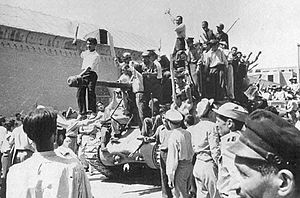1953 coup in Iran
| 1953 Iranian coup d'état | |||||||
|---|---|---|---|---|---|---|---|
| Part of the Abadan Crisis, and the Cold War | |||||||
 Coup supporters celebrate victory in Tehran |
|||||||
|
|||||||
| Government-Insurgents | |||||||
|
|
|
||||||
| Commanders and leaders | |||||||
|
|
|
||||||
| Units involved | |||||||
| Factions of the Iranian Imperial Army | |||||||
| Casualties and losses | |||||||
| 200—300 killed | |||||||
Successful overthrow of Prime Minister Mohammad Mosaddegh
The 1953 Iranian coup d'état, known in Iran as the 28 Mordad coup d'état (Persian: کودتای ۲۸ مرداد), was the overthrow of the democratically elected Prime Minister Mohammad Mosaddegh in favour of strengthening the monarchical rule of Mohammad Reza Pahlavi on 19 August 1953, orchestrated by the United Kingdom (under the name "Operation Boot") and the United States (under the name TPAJAX Project or "Operation Ajax").
Mossadegh had sought to audit the documents of the Anglo-Iranian Oil Company (AIOC), a British corporation (now part of BP) and to limit the company's control over Iranian petroleum reserves. Upon the refusal of the AIOC to co-operate with the Iranian government, the parliament (Majlis) voted to nationalize Iran's oil industry and to expel foreign corporate representatives from the country. After this vote, Britain instigated a worldwide boycott of Iranian oil to pressure Iran economically. Initially, Britain mobilized its military to seize control of the British-built Abadan oil refinery, then the world's largest, but Prime Minister Clement Attlee opted instead to tighten the economic boycott while using Iranian agents to undermine Mosaddegh's government.Winston Churchill and the Eisenhower administration decided to overthrow Iran's government, though the predecessor Truman administration had opposed a coup, fearing the precedent that CIA involvement would set. Classified documents show that British intelligence officials played a pivotal role in initiating and planning the coup, and that the AIOC contributed $25,000 towards the expense of bribing officials. In August 2013, 60 years after, the American Central Intelligence Agency (CIA) admitted that it was in charge of both the planning and the execution of the coup, including the bribing of Iranian politicians, security and army high-ranking officials, as well as pro-coup propaganda. The CIA is quoted acknowledging the coup was carried out "under CIA direction" and "as an act of U.S. foreign policy, conceived and approved at the highest levels of government".
...
Wikipedia
